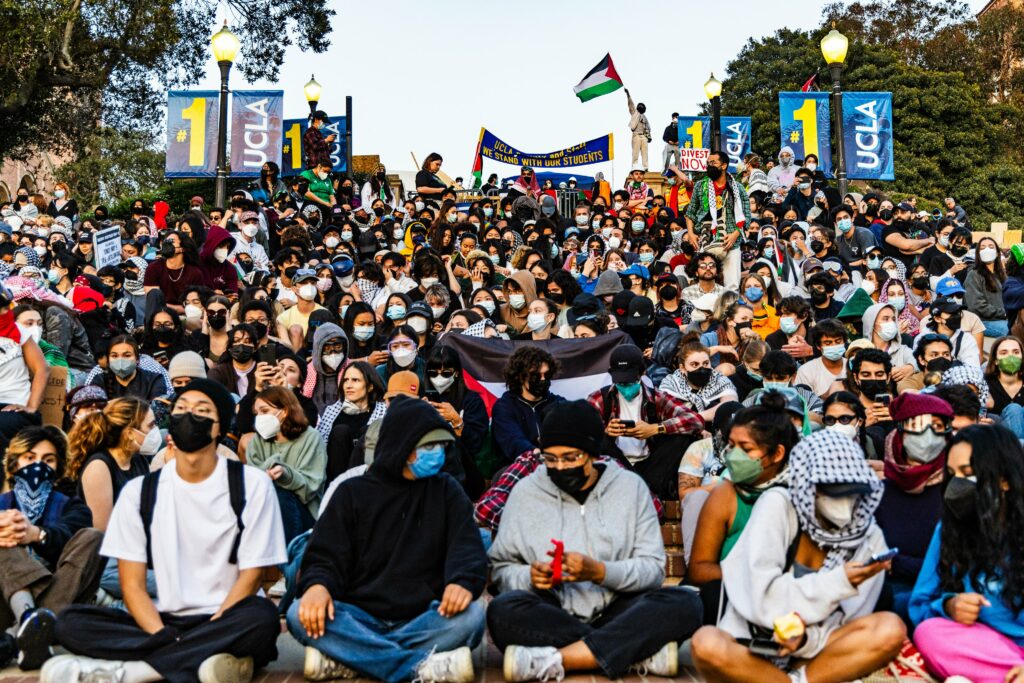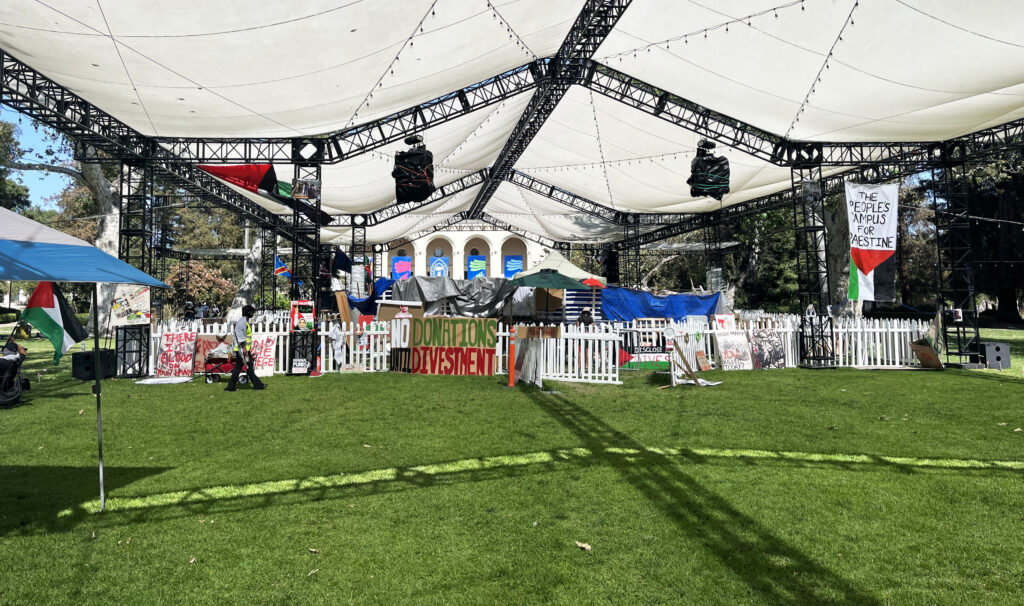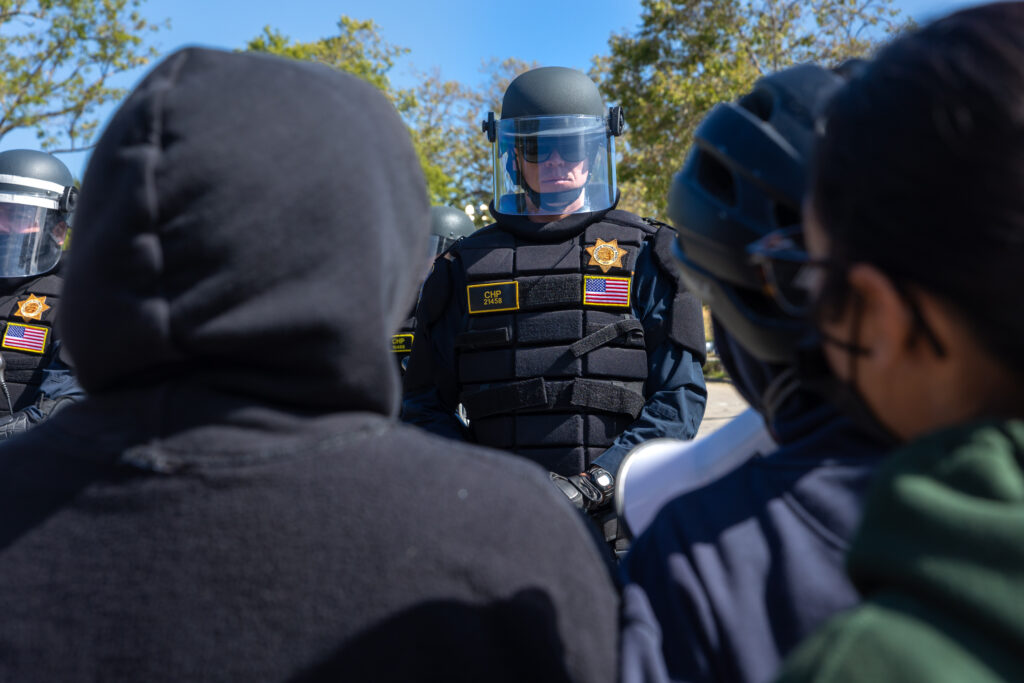
Hundreds of UCLA students protest in support of Palestinians on May 2, 2024.
Credit: Christine Kao
A critical presence persists across the dozens of university campuses nationwide where students have organized demonstrations in support of Palestinians: student journalists reporting for their school newspapers, at times providing round-the-clock coverage and, increasingly, doing so under threats of arrest and violence.
“They recognize that the eyes of the world are on college campuses and they can be a lens through which people can see what’s happening,” said Christina Bellantoni, director of the Annenberg Media Center at USC.
Student journalists are central to the reporting of historic national protests calling for universities to divest from companies with military ties to Israel and for a ceasefire in Gaza.
“We have a job to do as student journalists. I like to say we’re not student journalists, we’re journalists,” said Matthew Royer, national editor and higher education editor at the Daily Bruin, UCLA’s student newspaper.
At some schools that have shut down access to nonstudents, like USC, a private institution, student journalists are the only regular source of news on campus grounds. And at schools where journalists from outside news organizations are present, like UCLA, student journalists have remained top producers of the most accurate, up-to-date information.

The Daily Bruin had such high readership this week that its site was down for several hours Wednesday, requiring the newsroom to extend the site’s bandwidth.
Amid their reporting, some have also become part of the story.
This week at UCLA, a group of four student reporters were verbally harassed, beaten, kicked and pepper-sprayed by a group of pro-Israel counterprotesters who that night had attacked the on-campus encampment for hours.

At least one of the reporters, Catherine Hamilton, went to the hospital with injuries after the violent assault.
“Truly, there’s not much time for us to recover. As the new day starts, we have to be prepared for anything to happen,” Hamilton said in an interview with CNN. She returned to her reporting post shortly after being released from the hospital.
Royer confirmed that UCLA had promised journalists a safe room that night, but “the doors were locked, and they weren’t given access by the hired UCLA security.”
UCLA has not responded to a request for comment.
In a statement Thursday, UCLA Chancellor Gene Block said the violence on campus “has fractured our sense of togetherness and frayed our bonds of trust, and will surely leave a scar on the campus.”
His statement made no reference to the assault on journalists.
“I think it’s our jobs to continue to do what we can in the safest manner possible,” said Royer, who said counterprotesters have yanked his press badge, blasted megaphones near his ears, and blocked his camera over multiple days while reporting.
Student journalists nationwide have also been threatened with arrest by police arriving on campus to clear student encampments.
“We train these students to put safety first,” said Bellantoni. “What I cannot guarantee is that they won’t be arrested in this. If they are arrested, I can guarantee you those charges will not stand and we will make sure that we fight that because journalists have a right to be there and a right to witness it.”

Protests in support of Palestine are nothing new on UC Berkeley’s campus, according to Aarya Mukherjee, 19, who has covered campus activism and the encampment as a student life reporter for months at The Daily Californian.
But when he heard Daily Bruin reporters were assaulted, he said he “felt for them.”
“Last night, there was a very good chance of a raid. … So we were kind of preparing for the same thing to happen to us,” Mukherjee said, noting that the campus has been generally peaceful with little hostility toward the press. “It’s honestly scary, but … we accept that risk. We just hope it doesn’t happen.”
Given UC Berkeley’s history of protest and constant stream of student activism, managing editor Matt Brown said Daily Cal reporters are uniquely prepared to cover events that may turn violent. For years, guidelines on staying safe have been passed down through the organization’s editors.
“Everybody’s always in pairs. Everybody’s always taking shifts. Everybody’s always communicating. Nobody goes out there without a press pass,” Brown said.

The Daily Cal published an editorial late Wednesday that expressed solidarity with reporters at The Daily Bruin. It also condemned UCLA for failing to protect campus journalists.
“Everybody was on board; and within about an hour, we had a draft,” Brown said.
“We condemn the attackers and any attempt to stifle student coverage,” the editorial read. “It is the community’s duty to safeguard the students who are putting themselves in harm’s way to keep them informed.”
Many have also collaborated across campuses, a sign of their understanding that they hold a powerful position. The Daily Trojan, the Daily Bruin, the Emory Wheel, The Daily Californian, Washington Square News (NYU), the Berkeley Beacon (Emerson College) and the Daily Texan (UT Austin) joined forces to produce a compilation of photos of protests at their respective campuses.
‘That’s our Achilles’ heel’
Mercy Sosa, 22, received a tip that protests were starting at Sacramento State University on Monday at 6 a.m.
As editor-in-chief of The State Hornet, she got to work. By 6:30 a.m., she was on the scene — and continued to report on developments at the encampment for the next two days despite upcoming final exams.
“The amount of walking I did, the amount of not sleeping that I did — it’s exhausting,” Sosa said. “But I felt like it was my duty to be there and to make sure that students knew what was going on. And this isn’t just a Sac State story: This is a national story. … I couldn’t just turn a blind eye.”
The campus announced the encampment could remain intact until May 8. Unlike at other campuses, student reporters at Sacramento State haven’t faced aggression from campus or other stakeholders. The environment, Sosa said, has been mostly peaceful, with some counterprotesters and few police.
It’s similar at Sonoma State University, where Ally Valiente’s team at the Sonoma State Star are covering their growing student encampment.
But the current calm hasn’t made it easier for them to stomach the violence that played out at UCLA.
“It sort of makes me scared this could actually happen to any campus,” said Valiente, news editor.
Being a member of student media, where reporters and protesters can interact student-to-student, has played a key role in developing trust with sources, who are sometimes classmates, according to Chris Woodard, a managing editor at The State Hornet.
It’s a unique level of access that Brad Butterfield leaned into while reporting for Cal Poly Humboldt’s The Lumberjack, along with his knowledge of campus grounds.
Not all reporters covering Humboldt’s protests understood “how complex our campus is,” he said, which impacted police when it came to “gaining control.”
They also often work alongside journalists from other publications, who at times forget they are students.
Woodard recalled being in line for an interview by the encampment alongside a half dozen reporters from other publications.
“I kind of went up to all the other publications like ‘Hey guys, if you can please do me a favor and let me do the next interview? I have to go to class,’” Woodard said.
“I could tell this by the reaction of all the other professional journalists they’re like, ‘Oh, yeah, that’s a thing for you.’”
They let him go ahead — and he made it to class 20 minutes late.
Mukherjee and his Daily Cal colleagues are taking shifts to cover the protests and encampment, sometimes reporting in the field for 24 hours straight in the days leading up to final exams.
He said a relentless news cycle has made it harder to focus on school and that it is sometimes hard to separate life as a student from life as a reporter.
“Students should obviously be studying, hitting the books,” Mukherjee said. “Because of the constant news, we feel as though … we have a responsibility to report that, kind of, almost supersedes our due diligence as students.”
Others, like The Lumberjack’s Butterfield, did not attend class once protests began.
“Because I am a journalism major, I think that’s important to note: I don’t feel like I’m missing out too much on what’s happening in my classes because I’m out in the field doing what I’m going to school to learn how to do,” said Butterfield, 26. “When there’s a massive and important story on our campus to cover, at least my professors have been pretty lenient in understanding that that does take its priority in a lot of ways — and I’ll catch up on my work at some point in the next week or two.”
With local newsrooms growing sparse, Sosa said student press has become increasingly important in filling that void of local coverage for both the campus and larger community.
But in communities like Humboldt, student coverage is sometimes nonexistent over the summer.
“I think that’s our Achilles’ heel, when the semester ends a lot of folks kind of go their own separate ways, especially here in Humboldt County ’cause there’s so little jobs,” said Butterfield.
Woodard also said that “it’s hard to bear that pressure” for being at the forefront of national reporting as a student.
“You’ve become the No. 1 news source for the biggest story in the country. But at the same time, we have finals next week,” said Woodard, 30. “It’s like, which one do I take more pride in?”
A few days ago, he said he sat on the floor of his apartment and cried.
The toll, he said, can be especially difficult on editors — who are not only going to school and contributing to coverage, but also managing teams of their peers and classmates, often in their late teens or early 20s.
“Being an editor of student media and being an editor in real media are two very, very different things,” Woodard said. “For all the student editors out there that are dealing with this: I hope everyone just gives them a hug.”







